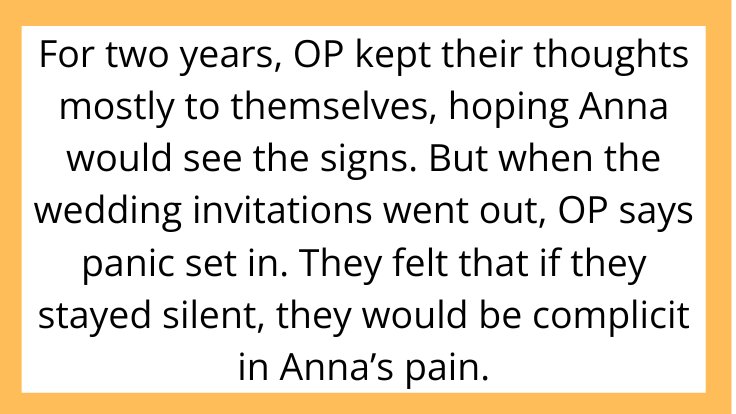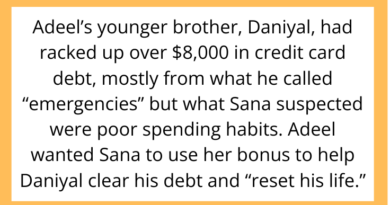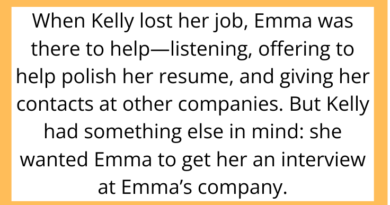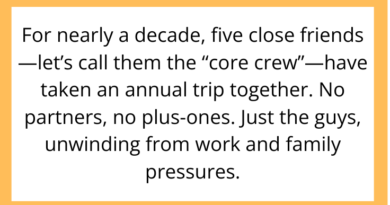AITAH for Telling My Best Friend She’s Making a Huge Mistake Marrying Her Fiancé?
When I stumbled upon this post in the r/AITAH community, it struck a nerve. The original poster (OP) asked if they were the bad guy for telling their best friend—right before the wedding—that she was making the worst decision of her life by marrying her fiancé.
This scenario touched on loyalty, honesty, timing, and the fine line between helping and hurting. In this post, we’ll break down the complexities, explore why so many readers were split, and consider whether brutal honesty can ever be the right choice when it risks ending a friendship.
Let’s dig in.
The Situation: A Friendship Tested

OP shared that they’ve been best friends with “Anna” since childhood. They described Anna as smart, kind, and endlessly loyal. But when Anna started dating “Mark,” OP immediately sensed red flags—he was controlling, dismissive, and frequently made belittling comments about Anna in front of others.
For two years, OP kept their thoughts mostly to themselves, hoping Anna would see the signs. But when the wedding invitations went out, OP says panic set in. They felt that if they stayed silent, they would be complicit in Anna’s pain.
A week before the wedding, OP sat Anna down and said plainly: “You’re making a huge mistake marrying Mark.” Anna was shocked and hurt. She told OP they’d crossed a line and accused them of jealousy. Within hours, OP was uninvited from the wedding. Their entire friend group took sides.
Loyalty vs. Honesty: Where Do You Draw the Line?

The Argument for Brutal Truth
Some commenters praised OP’s honesty. They argued that true friendship sometimes requires saying things no one else will. If you see someone walking into a situation that could harm them emotionally or financially, isn’t it more loyal to speak up than to watch quietly from the sidelines?
OP emphasized that their intention wasn’t to sabotage Anna’s happiness but to protect her from what they believed would be years of misery. To OP, remaining silent felt like betrayal.
The Case Against Bad Timing
Others felt that even if OP was right, the timing was terrible. Announcing your disapproval a week before the wedding can feel like an ambush. It leaves no room for calm reflection and puts enormous pressure on the bride at a vulnerable time.
Some readers pointed out that if OP truly believed Mark was dangerous or abusive, they should have shared those concerns much earlier. Waiting until the final countdown made it look more like sabotage than care.
The Emotional Fallout

Hurt Feelings and Broken Bonds
The aftermath was ugly. Anna cut off all communication. OP’s friends split into camps—some siding with Anna, others defending OP’s right to be honest. OP says they’ve been second-guessing themselves ever since, wondering if they destroyed a 15-year friendship over something that wasn’t their place to judge.
This situation highlights how complicated friendships can become when life-changing decisions are involved. Even if your intentions are good, the impact can be devastating.
Reflection and Regret
In later comments, OP admitted they wished they had handled it differently. Maybe a private letter or a conversation months earlier would have landed better. But in the moment, they felt they had no choice but to be direct.
Are You Obligated to Support All Choices?

This question came up repeatedly in the discussion. Is a friend obligated to support every choice, even when they see disaster ahead? Some people argued yes—friends should offer gentle guidance but ultimately respect autonomy. Others insisted that true loyalty sometimes means risking a friendship to save someone you love.
There’s no universal answer. Every friendship has different boundaries, levels of trust, and expectations.
Takeaways: Navigating High-Stakes Conversations

Here are a few things to consider if you ever find yourself in a similar position:
-
Timing matters. Share concerns early, not right before major milestones.
-
Be specific. Instead of blanket statements like “You’re making a huge mistake,” cite specific behaviors you’ve observed.
-
Respect autonomy. You can share your truth, but ultimately, your friend’s choices belong to them.
-
Prepare for fallout. Even with the best intentions, hard truths can end relationships.
-
Offer support regardless. If your friend goes through with it, be there to help if they need you later.



